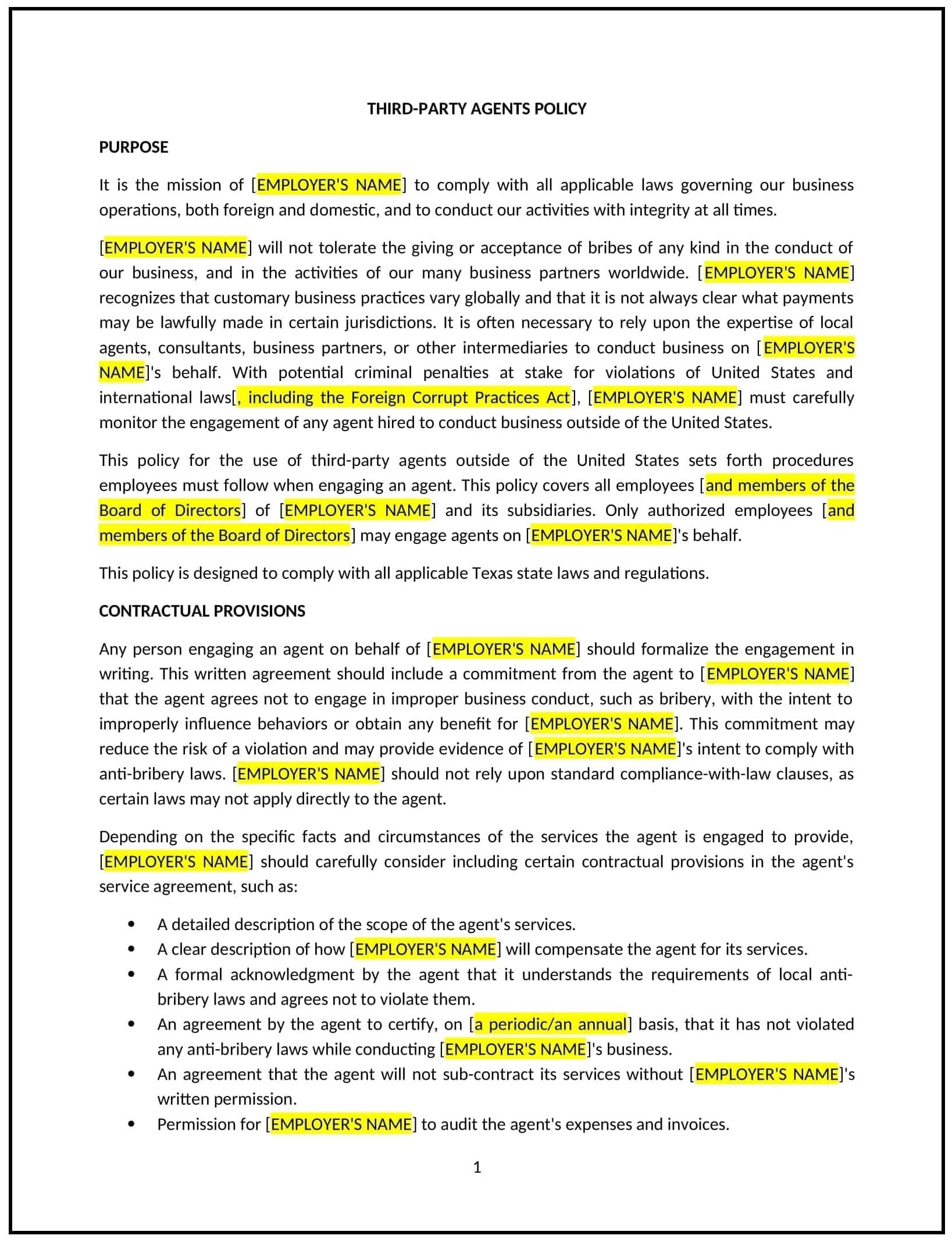Got contracts to review? While you're here for policies, let Cobrief make contract review effortless—start your free review now.

Customize this template for free
Third party agents policy (Texas)
This third party agents policy is designed to help Texas businesses establish clear guidelines for engaging third-party agents, contractors, or service providers. The policy outlines the expectations for third-party relationships, including compliance with company standards, legal requirements, confidentiality agreements, and ethical conduct, ensuring that third-party agents represent the company responsibly.
By adopting this policy, businesses can manage risks associated with outsourcing, promote accountability, and ensure that third-party agents comply with relevant Texas state laws, federal regulations, and the company’s internal standards.
How to use this third party agents policy (Texas)
- Define third-party agents: Clearly define who is considered a third-party agent under the policy, including independent contractors, vendors, service providers, consultants, and any external parties engaged to perform services on behalf of the company.
- Set compliance expectations: Outline the compliance requirements for third-party agents, including adherence to company policies, Texas state laws, federal regulations, and industry-specific standards (such as data protection laws or ethical guidelines).
- Establish performance standards: Specify the performance expectations for third-party agents, including quality of service, timelines, deliverables, and any other relevant criteria that must be met.
- Address confidentiality and data protection: Ensure that third-party agents understand and comply with the company’s confidentiality agreements, especially when handling sensitive information, trade secrets, or customer data. Specify how third parties should protect this information and the consequences of failing to do so.
- Require written agreements: Outline the need for formal, written agreements with third-party agents that clearly define the scope of work, compensation, confidentiality obligations, timelines, and legal compliance requirements.
- Monitor and assess third-party performance: Specify the company’s procedures for monitoring and assessing the performance of third-party agents, including regular reviews, audits, and evaluations to ensure compliance with the agreed-upon terms.
- Set procedures for terminating third-party agreements: Provide clear guidelines for terminating agreements with third-party agents, including acceptable grounds for termination, the process for notification, and any obligations upon termination (such as returning company property or sensitive data).
- Ensure non-discrimination and ethical conduct: Emphasize that third-party agents should act ethically, avoid conflicts of interest, and comply with non-discrimination policies in all their dealings, including with employees, customers, and other third parties.
Benefits of using this third party agents policy (Texas)
This policy offers several benefits for Texas businesses:
- Reduces legal risks: By setting clear expectations for third-party agents and ensuring compliance with applicable laws and regulations, businesses can reduce the risk of legal issues, including breaches of contract, privacy violations, or failure to comply with industry standards.
- Promotes accountability: The policy ensures that third-party agents are held accountable for their actions and performance, which helps prevent misconduct, poor service delivery, or ethical breaches.
- Enhances business operations: By establishing performance standards and monitoring third-party agents, businesses can ensure that external service providers contribute effectively to the company’s operations, improving overall productivity and service quality.
- Protects confidential information: The policy helps safeguard sensitive business information by requiring third-party agents to adhere to confidentiality agreements and data protection protocols, reducing the risk of data breaches.
- Strengthens company reputation: By maintaining high standards for third-party engagements, businesses can enhance their reputation as a responsible and ethical company that works with trustworthy partners.
- Improves risk management: Clear procedures for managing third-party relationships help businesses identify and mitigate potential risks, such as breaches of contract, compliance violations, or failure to meet business objectives.
Tips for using this third party agents policy (Texas)
- Communicate the policy clearly: Ensure that all employees, especially those involved in managing third-party relationships, are aware of the policy and its requirements. This can be communicated during training or included in the employee handbook.
- Perform due diligence: Before engaging with third-party agents, conduct thorough background checks and due diligence to ensure that the agents are trustworthy, reliable, and compliant with the company’s standards.
- Negotiate clear agreements: Ensure that all agreements with third-party agents are clear, detailed, and legally binding. Specify the scope of work, timelines, performance expectations, and compliance obligations.
- Monitor third-party performance regularly: Regularly assess the performance of third-party agents through reviews, audits, and feedback to ensure they are meeting agreed-upon standards. Address any issues promptly to maintain effective working relationships.
- Enforce contract terms: Monitor and enforce contract terms with third-party agents to ensure compliance with the agreement. Take corrective action when necessary, including terminating contracts or taking legal action in case of non-compliance.
- Review the policy periodically: Regularly review and update the policy to ensure it aligns with changing laws, regulations, and business practices related to third-party relationships.